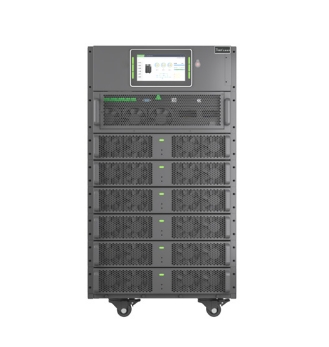language
In industries where uninterrupted power is essential, even a momentary outage can lead to system failures, data loss, equipment damage, or halted operations. For data centers, hospitals, manufacturing plants, and financial institutions, the margin for error is incredibly slim. That’s why investing in a large UPS (Uninterruptible Power Supply) power supply is not just a precaution—it's a necessity.
A large UPS system provides more than backup power—it ensures electrical stability, safeguards critical infrastructure, and supports long-term business continuity. In this article, we examine the key benefits of installing a large UPS power supply for mission-critical operations, and how intelligent modular systems like the AF9900 series can meet high-performance demands.
What Is a Large UPS Power Supply?
A large UPS power supply refers to high-capacity systems designed to support multiple devices or entire facilities with uninterrupted power during mains failure or instability. These systems are engineered for scalability, reliability, and efficiency, often capable of supporting three-phase power inputs and outputs to meet industrial requirements.
Unlike smaller desktop UPS units, large UPS systems are typically modular, centralized, and capable of advanced monitoring and power conditioning.
Key Benefits of Large UPS Power Supplies
1. Uninterrupted Power for Critical Systems
A large UPS provides seamless backup power, ensuring essential operations remain uninterrupted during outages, brownouts, or surges. This is particularly important for:
Data centers and servers
Hospital operating rooms and ICU units
Industrial control systems
Security and monitoring infrastructure
By acting as a buffer, the UPS eliminates downtime risks that could lead to safety concerns or revenue loss.
2. Power Conditioning and Surge Protection
Beyond simply supplying backup power, large UPS systems also act as power conditioners. They filter out line disturbances such as surges, frequency fluctuations, and electrical noise, creating a stable power environment for sensitive equipment.
As highlighted in the capabilities of the AF9900 series:
AF9900 series is an intelligent modular UPS with single or three phase input and single or three phase output, which adopts online double conversion design and is based on DSP full digital control to provide stable and uninterrupted power supply for important loads. It can eliminate "power pollution" such as surge, instantaneous high voltage, instantaneous low voltage, wire noise and frequency deviation on the mains, and provide customers with high-efficiency and high-power density power supply guarantee.
This level of power quality ensures long-term protection and reliability for high-stakes systems.

AF9900 series Online Modular UPS
3. Modular Scalability and Flexibility
Large UPS systems like the AF9900 series are often modular in design, which allows for scalability as power demands grow. This means additional modules can be added without replacing the entire system, offering cost-efficiency and flexibility.
Whether you're powering a growing server farm or expanding production lines, modular UPS systems adjust to evolving needs without operational disruption.
4. Improved Operational Efficiency
Modern UPS systems are designed with high energy efficiency in mind, minimizing heat generation and reducing cooling demands. Features like online double conversion with advanced digital signal processing (DSP) help optimize performance while keeping power losses to a minimum.
This not only reduces energy bills but also contributes to sustainability goals and lowers the total cost of ownership.
5. Remote Monitoring and Diagnostics
Today’s large UPS systems include advanced monitoring and management capabilities. Administrators can track load levels, battery health, and input/output conditions in real time. Many units integrate with network management platforms for remote diagnostics and alerts, ensuring problems are identified before they affect operations.
Applications That Demand a Large UPS System
Data Centers: To prevent server crashes and data loss
Hospitals and Clinics: To power life-saving equipment and medical systems
Manufacturing Plants: To maintain process control and automation systems
Financial Institutions: To ensure transaction processing and record integrity
Telecommunications: To protect switching and communication infrastructure
A large UPS power supply is not just an emergency backup system—it is a critical part of infrastructure for any organization that cannot afford downtime, power disturbances, or data loss. Systems like the AF9900 series provide not only power continuity but also stability, efficiency, and scalable protection that supports evolving operational needs.
In environments where every second matters, installing a large UPS is a proactive investment in resilience, reliability, and long-term performance.